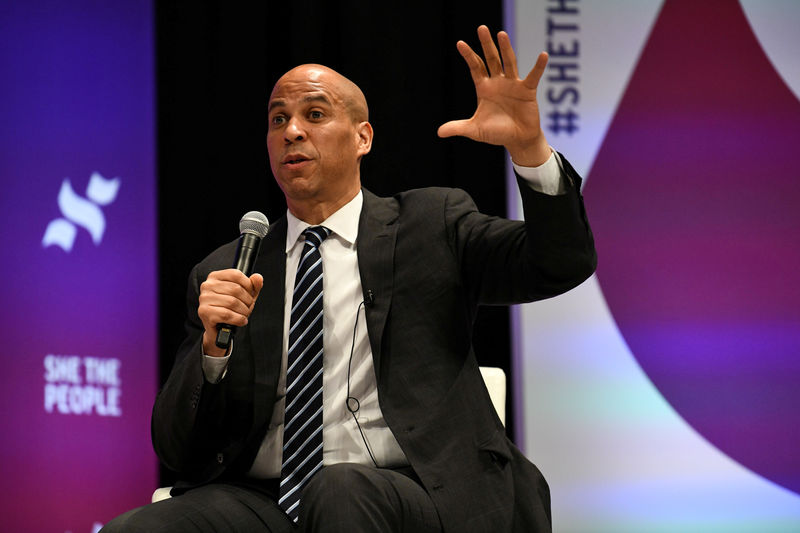By Joseph Ax
(Reuters) - Democratic presidential hopeful Cory Booker said on Thursday he would consider releasing thousands of nonviolent drug offenders from federal prisons, vowing to use the president's pardon power to address inherent inequality in the justice system.
Booker, a U.S. senator from New Jersey and one of two dozen Democrats competing for their party's nomination for the 2020 presidential election, said he would initiate a sweeping clemency program aimed at those serving "unjust and excessive sentences" for drug crimes, including marijuana-related offenses.
The plan builds upon Booker's longstanding focus on criminal justice reform. The senator helped author the First Step Act, a bipartisan bill signed into law last year by President Donald Trump easing minimum sentences for drug crimes that had an outsized impact on minorities.
"The War on Drugs has been a war on people, tearing families apart, ruining lives, and disproportionately affecting people of color and low-income individuals — all without making us safer," Booker said in announcing the proposal. Booker, who is African-American and a Yale-educated lawyer, was previously mayor of Newark, one of New Jersey's poorest cities.
The United States has the highest incarceration rate of any country in the world, according to researchers.
The U.S. constitution grants the president essentially unlimited power to offer clemency – either a full pardon or a commutation, which shortens a sentence while the conviction stands.
Under Booker's plan, more than 11,000 people serving time for marijuana offenses would be eligible for clemency. Booker's campaign noted that while using marijuana is roughly equally prevalent across races, black people are nearly four times as likely to be arrested as white people for its use.
In addition, nearly 4,000 inmates serving the kind of minimum sentences now reduced under the First Step Act could receive clemency, as well as prisoners serving more time as a result of sentencing disparities between crack and powder cocaine.
Booker's proposal calls for an executive panel to review eligible cases. While the panel would start from a presumption of recommending clemency, it would decline any cases in which the defendant poses a threat to the public.
The process would be more efficient than the current system, which includes a series of steps through the Justice Department and the White House Counsel's office.
Other Democratic candidates have weighed in on clemency, most notably U.S. Senator Amy Klobuchar of Minnesota, who said she would establish an advisory board to streamline the process and focus primarily on drug offenders. U.S. Senator Kamala Harris of California, like Klobuchar a former prosecutor, has also said she would look to pardon low-level drug offenders.
In 2014, President Barack Obama launched a more limited clemency initiative that encouraged certain nonviolent drug offenders serving mandatory minimum sentences to apply.

Booker is averaging between 2 and 3 percent in public polling, putting him around seventh place in the crowded field of candidates.